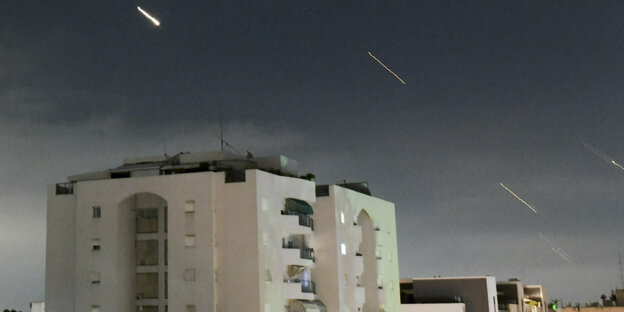Israel repelled the Iranian attack with the help of its allies. But what will happen next in the Middle East war? Is an Israeli counterattack imminent?

Defensive bullets in the sky over central Israel on Sunday morning Photo: Tomer Neuberg/ap
JERUSALEM taz | It was an attack with an announcement: when the sirens sounded in Jerusalem at 1:42 a.m. Sunday, many were already sitting in prepared emergency bags. It has been known for several hours that Iran has carried out its threats and has fired several hundred drones and missiles towards Israel.
Minutes later, dozens of people descend the stairs toward an air raid shelter near Jerusalem's Old City. In their backpacks they carry water, blankets, power banks, everything they need to last a few days. “We don't know how long it will take this time, this is different from Hamas rockets,” says a woman wearing the veil of religious Jews and holding her three-year-old son in her arms.
With wide eyes, the boy observes the neighbors who have settled along the walls of the narrow room. Outside, points of light from defense missiles pierce the night sky over the brightly lit Temple Mount, followed by the dull rumble of several explosions.
The go-ahead came early in the morning: Of the approximately 300 missiles that the Israeli military says were sent from Iran, 99 percent were intercepted, most before they reached Israeli territory. Army spokesman Daniel Hagari speaks of a “very significant strategic success.” Defense support was provided by the United States, Great Britain and Jordan.
According to initial reports, a seven-year-old girl was injured by falling debris near the Bedouin city of Arad in southern Israel. An Israeli military base was slightly damaged. In the morning, Israel, Jordan, Iraq and Lebanon reopened their previously closed airspace.
Hezbollah said it fired dozens of rockets at Israeli military posts in the Israeli-occupied Golan Heights on Sunday morning. The group said the attack was in retaliation for overnight Israeli airstrikes on cities and towns in southern Lebanon that killed and wounded civilians. Earlier, one person was killed in an Israeli airstrike in Lebanon.
Is Netanyahu fighting back?
The urgent question now is: what will happen next? In the past, long-standing hostility between Iran and Israel has been combated through proxies such as the Iranian-backed Hezbollah in Lebanon or the Houthis in Yemen. After the Hamas attack on October 7, Tehran repeatedly emphasized that it did not want a war with Israel. Since October 7, rockets have been repeatedly fired towards Israel from Lebanese and Syrian territory, as well as from Yemen. Israeli leaders react with airstrikes, usually without officially claiming responsibility.
A direct attack by Iran on Israel was previously considered unlikely due to the immense potential for escalation, even after the bombing of the Iranian consulate in Damascus on April 1, which killed a senior general in the Iranian Revolutionary Guard.
A meeting of the Israeli War Cabinet was scheduled for Sunday morning, at which the government had decided to take further measures that night. The decision on Israel's response to the Iranian attack rests with Prime Minister Benjamin Netanyahu, Defense Minister Joav Galant and former opposition leader Benny Gantz.
United States against Israeli retaliation
US President Joe Biden assured Netanyahu in a half-hour phone call this morning that US support was “strong.” At the same time, he warned, according to the news site axios, the United States would not support a counterattack against Iran. “You have won, accept this victory,” Biden said, referring to the successful defense of the attack.
The government in Tehran also seems to expect a moderate response from Israel: “The matter can be considered closed,” wrote Iran's permanent mission to the United Nations in the online service was the conflict between Iran and Israel.
Netanyahu and hardline members of his partly far-right government have long talked about a possible attack on Iran's nuclear program, which they see as an existential threat to Israel. Netanyahu has also been repeatedly accused in the Israeli media of continuing the war in Gaza out of political ambitions to prevent new elections. According to the American broadcaster NBC, there is concern in the American government that Israel could take action “without considering the possible consequences.”
However, there are some signs that an Israeli retaliation is not imminent. On the one hand, the Iranian attack shows the extent to which Israel depends on its defense to obtain the support of its allies, who call for restraint. The UN Security Council will also meet on Sunday afternoon (local time) in New York at the request of Israel. He New York Times reported on Sunday, citing an Israeli official, that “Israel's response will be coordinated with its allies.”